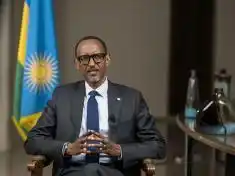
Rwandan President Paul Kagame has stated that he does not know whether Rwandan troops are present in the eastern Democratic Republic of Congo (DRC), where intense fighting between the M23 rebel group and Congolese forces has resulted in over 900 deaths and thousands of injuries.
In an exclusive interview with CNN, Kagame was directly asked whether Rwandan soldiers were inside the DRC. His response: “I don’t know.” This statement has raised eyebrows, given his role as the commander-in-chief of the Rwandan Defence Force.
“There are many things I don’t know,” Kagame added. “But if you want to ask me whether there is a problem in Congo that concerns Rwanda, and if Rwanda would do anything to protect itself, I’d say 100%.”
International Accusations and Rwanda’s Denial
The United Nations (UN) and other international organizations have long accused Rwanda of backing the M23 rebels. UN experts estimate that between 3,000 and 4,000 Rwandan troops are actively supporting and supervising M23 fighters in eastern DRC, reportedly outnumbering the rebel group’s forces.
However, M23 spokesperson Victor Tesongo denied any Rwandan involvement, telling CNN that claims of support from Kigali are “a manipulation of public opinion to disqualify us.” He argued instead that Rwanda is focused on fighting the Democratic Forces for the Liberation of Rwanda (FDLR), a militia group linked to the 1994 Rwandan genocide and accused of destabilizing the region.
Congo’s Response: “Only Kagame Denies This”
The Congolese government remains firm in its position that Rwanda’s military is actively involved in the conflict. DRC Communications Minister Patrick Muyaya dismissed Kagame’s denial, saying, “Kagame is the only voice denying this.”
“In the past 10 days, the UN Group of Experts, the UN Security Council, the UN Secretary-General, President João Lourenço of Angola, and SADC (Southern African Development Community) have all confirmed Rwanda’s military presence in eastern DRC. Kagame is the only one denying it,” Muyaya emphasized.
M23’s Advance and Kagame’s Stance
The situation escalated dramatically last week when M23 forces claimed to have captured Goma, a key city in eastern DRC. The UN Office for the Coordination of Humanitarian Affairs reported that at least 900 bodies have been recovered from the city’s streets since January 31.
In his interview, Kagame remained defiant, insisting that Rwanda faces an “existential threat” from the FDLR, which he alleges is integrated into the Congolese army. He emphasized that Rwanda would do “whatever it takes” to protect itself, without explicitly admitting to sending troops into the DRC.
“Nobody, including the UN or the international community, is going to do it for us,” Kagame declared.
When asked again whether Rwandan forces were in the DRC, Kagame reiterated, “Rwanda will do anything to protect itself,” leaving the interpretation open-ended.
Growing Comparisons to Russia’s Tactics
CNN’s Larry Madowo pressed Kagame on comparisons between his actions and those of Russian President Vladimir Putin, who supported separatist forces in Ukraine before launching a full-scale invasion. Kagame dismissed the analogy, saying, “There will be so many stories. I may be called anything what can I do about it?”
Escalation and Potential Consequences
The ongoing violence has raised fears of a broader regional conflict. DRC President Felix Tshisekedi has vowed a “vigorous and coordinated response” against M23, calling the group a “puppet of Rwanda.”
Meanwhile, M23 has declared its intention to expand its offensive. Spokesperson Tesongo told CNN that the group plans to “install a new administration” in Goma and push further, including into South Kivu province and the DRC capital, Kinshasa.
“Effectively, our struggle cannot be limited to Goma. The objective remains to overthrow Tshisekedi and install a new leadership capable of solving our people’s problems,” Tesongo said.
As tensions rise, the international community is closely monitoring the situation, with concerns that the conflict could further destabilize an already fragile region.






0 Comments